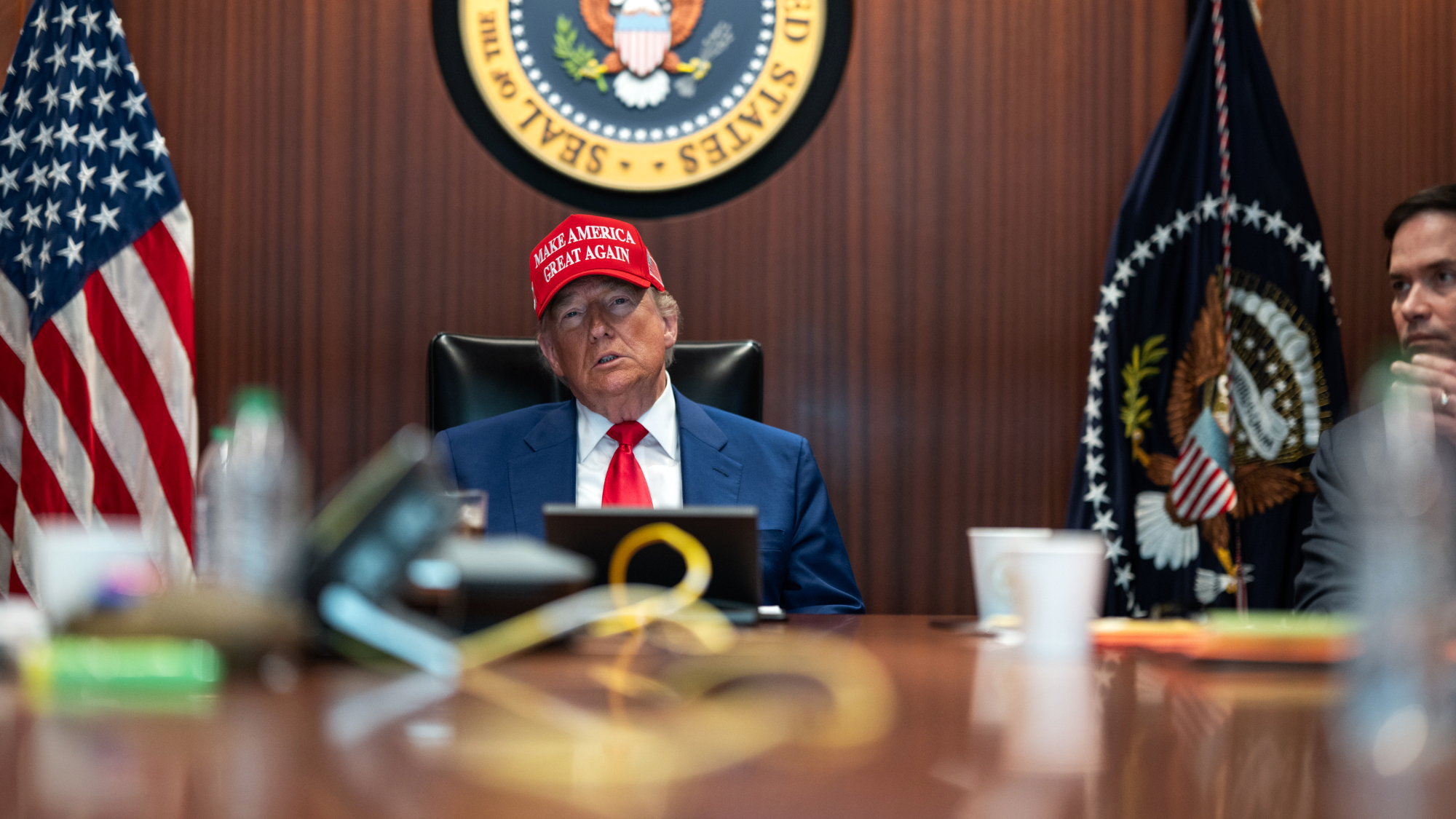US assessing bomb damage to Iran nuclear sites
Trump claims this weekend's US bombing obliterated Tehran's nuclear program, while JD Vance insists the US is 'not at war with Iran'


A free daily email with the biggest news stories of the day – and the best features from TheWeek.com
You are now subscribed
Your newsletter sign-up was successful
What happened
President Donald Trump said Sunday night that the U.S. bombing of three Iranian nuclear sites on Saturday resulted in the "obliteration" of Tehran's nuclear program. The U.S. military and the United Nations said it was too soon to assess the damage. Vice President J.D. Vance insisted the U.S. was "not at war with Iran," just "Iran's nuclear program," and he and other Cabinet officials stated on TV that the Trump administration was not aiming for "regime change." But Trump Sunday night said toppling the "current Iranian regime" was certainly on the table.
Who said what
The Trump administration's "conflicting" messages about the scope of U.S. involvement "highlights the difficulty" it faces as it "tries to navigate the fallout" from "its massive strike on Iran" and "mollify the factions of the MAGA base" opposed to joining Israel's war, Politico said. This is a "risky moment for Trump," The Associated Press said, especially as he has long "belittled his predecessors for tying up America in 'stupid wars'" in the Middle East.
Gen. Dan Caine, the chairman of the U.S. Joint Chiefs of Staff, said Sunday that initial assessments indicated "extremely severe damage and destruction" at the three nuclear facilities — Fordo, Natanz and Isfahan — hit by 30,000-pound U.S. "bunker-buster" bombs and Tomahawk missiles. But Rafael Grossi, the head of the U.N.'s International Atomic Energy Agency, said that "at this time, no one, including the IAEA, is in a position to assess the underground damage" at the sites.
The Week
Escape your echo chamber. Get the facts behind the news, plus analysis from multiple perspectives.

Sign up for The Week's Free Newsletters
From our morning news briefing to a weekly Good News Newsletter, get the best of The Week delivered directly to your inbox.
From our morning news briefing to a weekly Good News Newsletter, get the best of The Week delivered directly to your inbox.
U.S. officials also "conceded they did not know the whereabouts of Iran's supply of near-bomb-grade uranium," The New York Times said. A senior Iranian official told Reuters that the highly enriched uranium had been moved to undisclosed locations before the attack, a claim deemed probably true by outside experts and Israeli officials and bolstered by satellite photos.
What next?
At an emergency meeting of the U.N. Security Council Sunday, Iran's ambassador Amir Saeid Iravani said the U.S. had "recklessly chosen to sacrifice its own security merely to safeguard" Israeli Prime Minister Benjamin Netanyahu, and Tehran's military will decide the "timing, nature and scale of Iran's proportionate response." U.S. intelligence officials had "already detected signs that Iran-backed militias were preparing to attack U.S. bases in Iraq, and possibly Syria," the Times said.
A free daily email with the biggest news stories of the day – and the best features from TheWeek.com
Peter has worked as a news and culture writer and editor at The Week since the site's launch in 2008. He covers politics, world affairs, religion and cultural currents. His journalism career began as a copy editor at a financial newswire and has included editorial positions at The New York Times Magazine, Facts on File, and Oregon State University.
-
 Will increasing tensions with Iran boil over into war?
Will increasing tensions with Iran boil over into war?Today’s Big Question President Donald Trump has recently been threatening the country
-
 Corruption: The spy sheikh and the president
Corruption: The spy sheikh and the presidentFeature Trump is at the center of another scandal
-
 Putin’s shadow war
Putin’s shadow warFeature The Kremlin is waging a campaign of sabotage and subversion against Ukraine’s allies in the West
-
 Judge orders Washington slavery exhibit restored
Judge orders Washington slavery exhibit restoredSpeed Read The Trump administration took down displays about slavery at the President’s House Site in Philadelphia
-
 Kurt Olsen: Trump’s ‘Stop the Steal’ lawyer playing a major White House role
Kurt Olsen: Trump’s ‘Stop the Steal’ lawyer playing a major White House roleIn the Spotlight Olsen reportedly has access to significant US intelligence
-
 Hyatt chair joins growing list of Epstein files losers
Hyatt chair joins growing list of Epstein files losersSpeed Read Thomas Pritzker stepped down as executive chair of the Hyatt Hotels Corporation over his ties with Jeffrey Epstein and Ghislaine Maxwell
-
 Judge blocks Hegseth from punishing Kelly over video
Judge blocks Hegseth from punishing Kelly over videoSpeed Read Defense Secretary Pete Hegseth pushed for the senator to be demoted over a video in which he reminds military officials they should refuse illegal orders
-
 Trump’s EPA kills legal basis for federal climate policy
Trump’s EPA kills legal basis for federal climate policySpeed Read The government’s authority to regulate several planet-warming pollutants has been repealed
-
 House votes to end Trump’s Canada tariffs
House votes to end Trump’s Canada tariffsSpeed Read Six Republicans joined with Democrats to repeal the president’s tariffs
-
 Bondi, Democrats clash over Epstein in hearing
Bondi, Democrats clash over Epstein in hearingSpeed Read Attorney General Pam Bondi ignored survivors of convicted sex offender Jeffrey Epstein and demanded that Democrats apologize to Trump
-
 El Paso airspace closure tied to FAA-Pentagon standoff
El Paso airspace closure tied to FAA-Pentagon standoffSpeed Read The closure in the Texas border city stemmed from disagreements between the Federal Aviation Administration and Pentagon officials over drone-related tests
